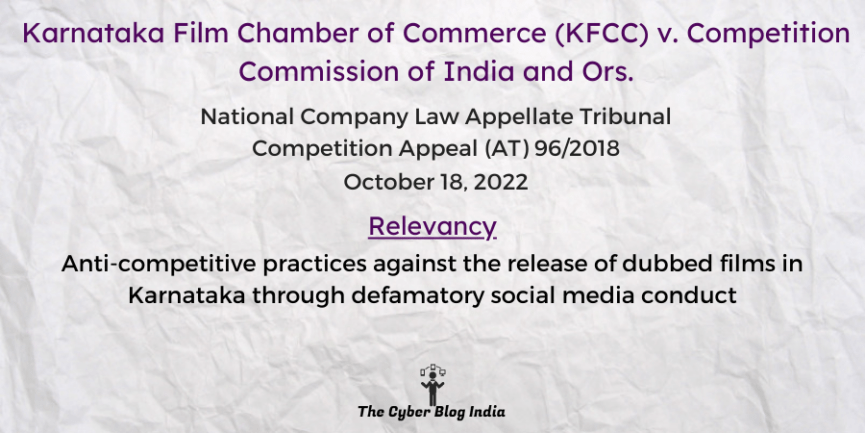Karnataka Film Chamber of Commerce v. Competition Commission of India and Ors.

Karnataka Film Chamber of Commerce (KFCC) v. Competition Commission of India and Ors.
In the National Company Law Appellate Tribunal
Competition Appeal (AT) 96/2018
Before Mr Rakesh Kumar, Judicial Member and Mr Kanthi Narahari, Technical Member
Decided on October 18, 2022
Relevancy of the case: Anti-competitive practices against the release of dubbed films in Karnataka through defamatory social media conduct
Statutes and Provisions Involved
- The Competition Act, 2002 (Section 2, 3, 19, 26, 53B)
- The Indian Evidence Act, 1872 (Section 65B)
- The Information Technology Act, 2000 (Section 92)
Relevant Facts of the Case
- The second respondent, a producer and former member of the appellant, purchased dubbing rights of the Tamil film “Yennai Arindhal” to dub into Kannada titled “Sathyadev IPS”.
- The appellant and respondents number 3 to 6 prevented and opposed the film’s release through inciteful tweets, threats, opposing press meets, YouTube videos, and protests.
- The fourth respondent posted multiple tweets threatening violence on the film’s release. He also organised a press conference where he threatened to burn theatres. Thereafter, he launched protests with KFCC members.
- The City Civil Court, Bangalore, had passed an ex-parte injunction order, restraining respondents 3 to 6 from getting involved in any defamatory conduct on social media.
- On receiving the second respondent’s complaint, CCI ordered its director general (DG) to conduct the investigation.
- The investigation found sufficient circumstantial evidence suggesting that the press meeting was a platform to cover the protests of opposing parties. The actions of the appellant, and respondents 3 to 6, aimed to prevent the release of dubbed movies, including Sathyadev IPS. They were undertaking these steps to ensure no competition to Kannada films.
- Based on these findings, the CCI issued a cease and desist order against the appellant. The appellant wilfully disobeyed this order.
Prominent Arguments by the Advocates
- The appellant’s counsel argued that the impugned order ignores the absence of evidence of an appreciable adverse effect on competition or any collusive act which attaches liability or culpability. Further, the Commission ignored the second respondent’s civil suits in Karnataka courts as revenge, abusing the process of law. Additionally, there is no evidence of an agreement between the other respondents and the Appellant.
- The second respondent’s counsel prayed for the dismissal of the appeal. He contended that the appellant deliberately restricted the market for dubbed films, violating Section 3 and cannot excuse itself by dis-association. Further, the DG report and the Commission’s order present sufficient evidence, and the order adheres to the law.
Opinion of the Bench
- Acts of the appellant and respondents 3 to 6 are anti-competitive in nature.
- The Commission’s order dealt with all the issues, including the evidence submitted by the DG.
- All the opposite parties had a unity of cause and a meeting of minds. There is ample evidence to show that all the acts were done in concert and in a well-planned manner.
Final Decision
- The Tribunal dismissed the appeal with no costs.
